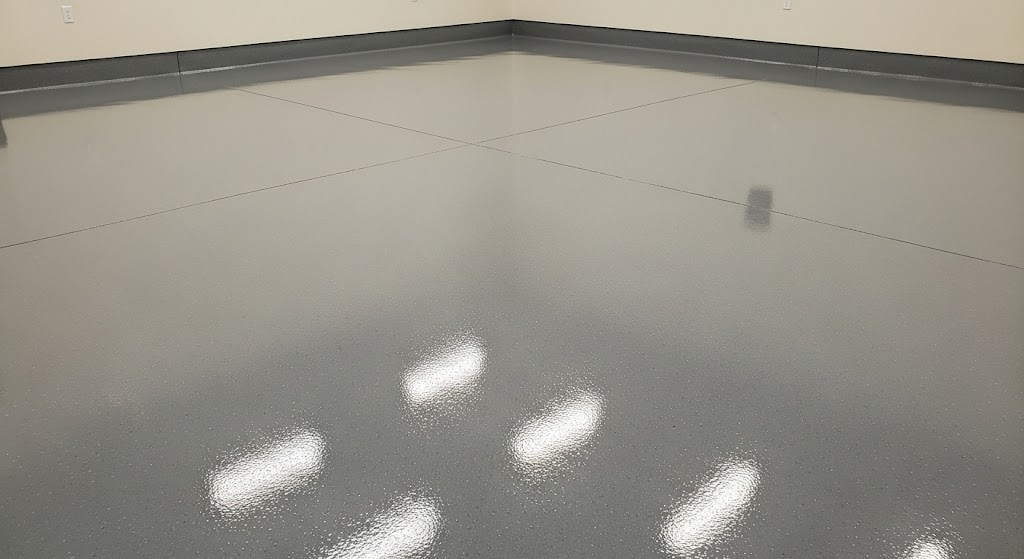Epoxy flooring is a top choice for garage upgrades, known for its durability, modern look, and easy maintenance. It provides a tough, durable surface that can handle heavy use while still looking neat and clean..
I remember when I first chose epoxy for my own garage, and I was amazed at how much easier it made cleaning up after working on projects.
With so many flooring options available, it can be overwhelming to choose the right one.
However, this guide will break down the key factors affecting the cost of epoxy garage floors and provide an overview of typical pricing. Understanding these factors will help you decide if epoxy flooring suits your garage and budget.
If you’re aiming for a high-end upgrade or simply want a practical, long-lasting solution, epoxy can offer a great balance of both.
What Are Epoxy Garage Floors?
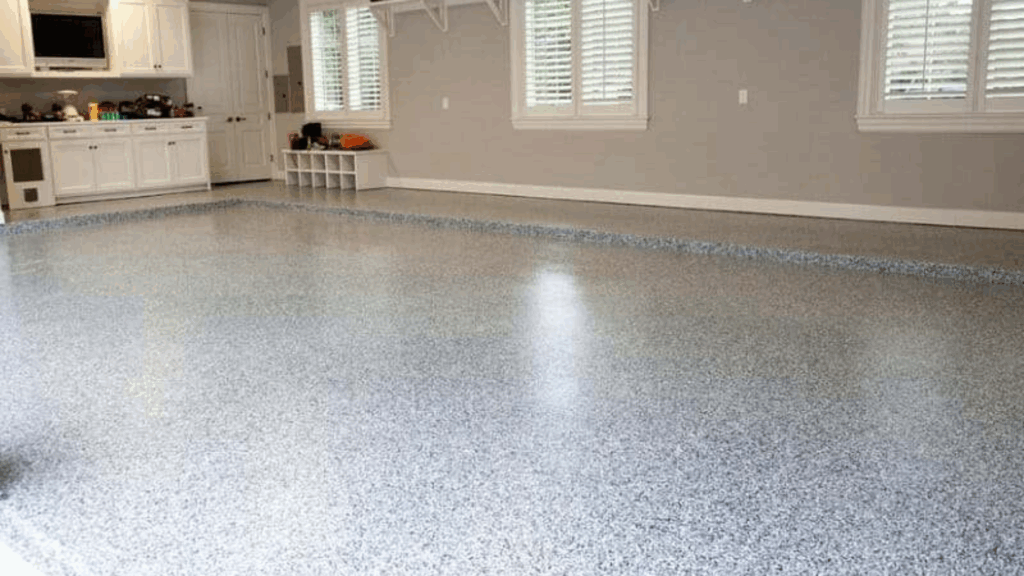
Epoxy garage floors are durable, high-performance surfaces created by applying a resin-based coating to concrete. It is made by combining a hardener and resin, forming a strong and durable surface.
This type of flooring is known for its ability to resist stains, scratches, and heavy impacts, making it ideal for high-traffic areas like garages.
Epoxy floors are customizable with various colors and finishes to match different styles.
They also offer a glossy, attractive look that’s easy to clean and maintain. Epoxy flooring has slip-resistant properties and can withstand harsh conditions.
It’s an excellent choice for homeowners wanting to improve both the functionality and appearance of their garage.
Average Cost of Epoxy Garage Floors
The cost of installing epoxy garage floors depends on several factors, including the size of your garage, the type of epoxy used, and whether you choose to complete the project yourself or hire a professional.
On average, DIY epoxy projects cost between $2-$5 per square foot, while professional installation ranges from $3-$12 per square foot.
For a standard two-car garage (about 400–500 sq. ft.), this translates to a total of $800 to $2,500 for DIY and $1,200 to $6,000 for professional installation.
The price variation is influenced by the type of epoxy chosen, the condition of the existing concrete, and any additional finishes or decorative elements.
While DIY projects may seem more cost-effective, professional installation can ensure a higher-quality, more durable finish, making it a better option for those seeking long-lasting results.
Factors Influencing Epoxy Garage Floor Costs
Several factors, such as garage size, epoxy type, surface preparation, and labor costs, can impact the overall price of installing epoxy flooring in your garage.
1. Garage Size
The size of your garage is one of the most significant factors affecting the cost of epoxy flooring. Larger garages require more materials and labor, which directly increases the overall expense.
For example, a standard two-car garage (400–500 sq. ft.) will cost more to cover than a single-car garage (200 sq. ft.). As the area increases, so does the quantity of epoxy needed for proper coverage and installation.
2. Epoxy Type
Different types of epoxy come with varying price tags due to their composition and durability. Water-based epoxy is the most affordable, costing $2 to $6 per square foot.
Solvent-based epoxy offers better resistance and costs between $4 and $10 per square foot.
The most durable option, 100% solids epoxy, ranges from $8 to $15 per square foot, making it ideal for high-traffic or commercial spaces.
3. Surface Preparation
Surface preparation is crucial for ensuring the epoxy adheres properly to the concrete.
If your garage floor has cracks, stains, or a lot of grime buildup, additional preparation may be necessary, which can raise the cost.
This process may include cleaning, etching, or patching the surface. The more work that needs to be done before applying the epoxy, the higher the cost will be due to extra materials and labor.
4. Labor Costs
Labor costs can vary depending on whether you choose a DIY project or hire a professional. For professional installation, labor typically ranges from $1 to $7 per square foot.
The complexity of the job, the region you’re in, and the experience of the contractor can all influence the cost.
Hiring a professional ensures a smoother, more durable finish but comes at a higher price compared to a DIY approach.
Types of Epoxy Flooring
There are several types of epoxy flooring, each offering different levels of durability, style, and performance, allowing you to choose the best option for your garage needs.
1. Water-Based Epoxy
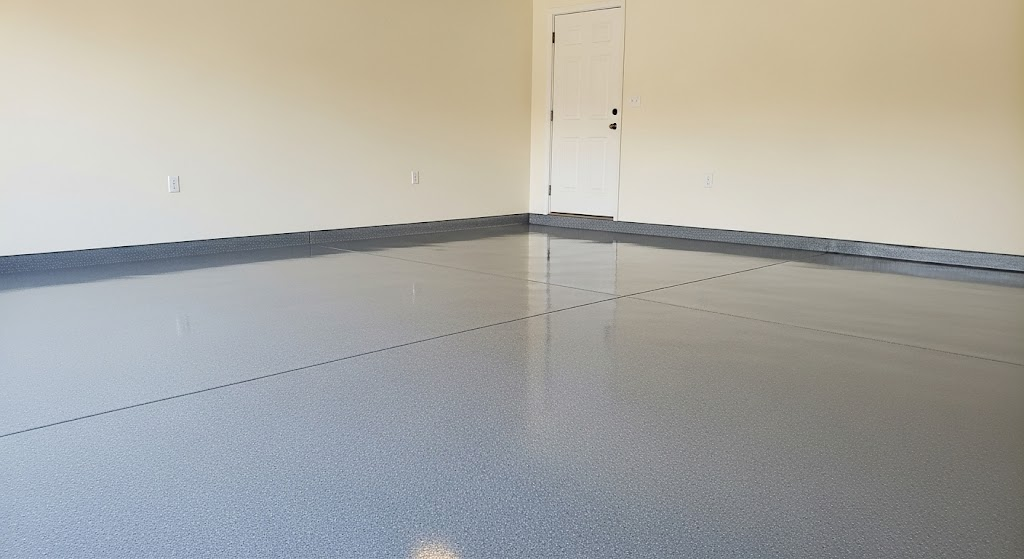
Water-based epoxy is an affordable option for garage floors. It’s easy to apply, dries quickly, and has a lower odor than other types.
However, it’s less durable than solvent-based or 100% solids epoxy, making it better for low-traffic areas.
While it provides a decent finish, it may not hold up as well to heavy wear and tear, so it’s best for smaller or less busy garages.
2. Solvent-Based Epoxy
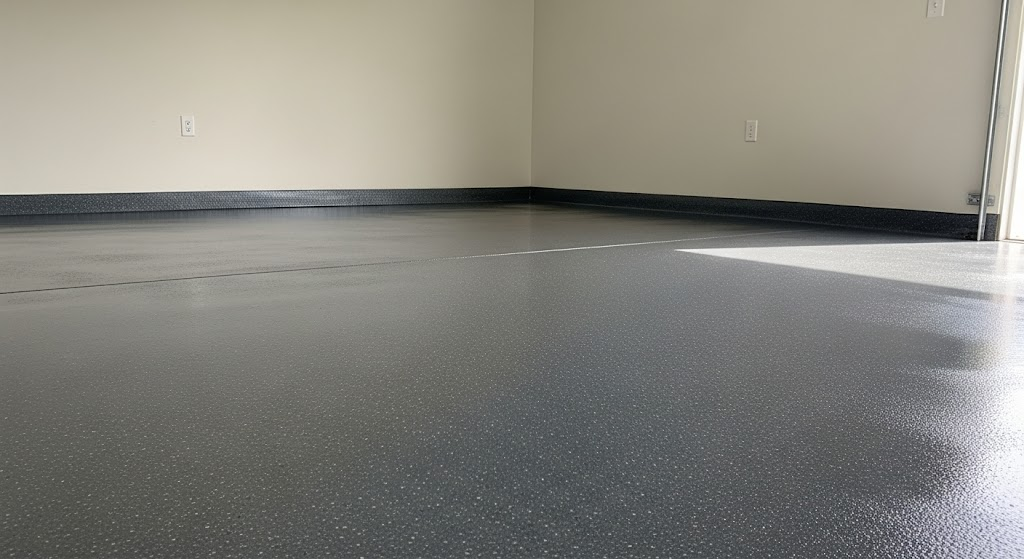
Solvent-based epoxy is more durable and resistant than water-based options.
It adheres well to concrete and delivers a stronger finish, making it perfect for garages with moderate to heavy traffic.
Although it takes longer to dry and has a stronger odor during application, its resistance to stains, chemicals, and abrasion makes it a favored choice for both residential and commercial spaces.
3. 100 Percent Solids Epoxy
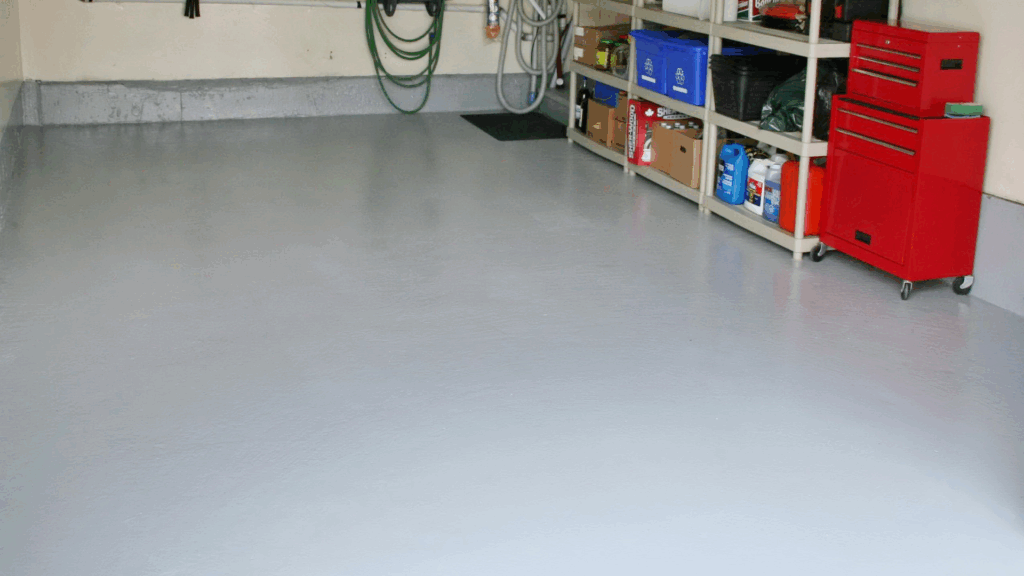
100% solids epoxy is the most durable and long-lasting option available. With no solvents or water added, it offers a high-performance coating that’s perfect for high-traffic areas.
This type of epoxy creates a thick, resilient surface that’s resistant to chemicals, stains, and heavy impacts.
It is often used in commercial and industrial settings, but it works equally well in residential garages that see a lot of activity.
4. Metallic Epoxy
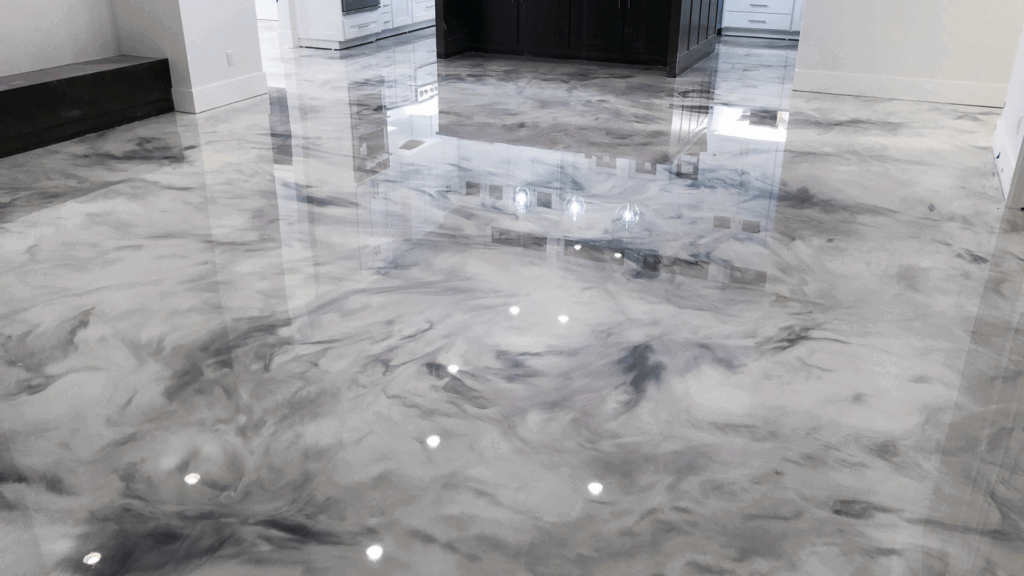
This epoxy contains metallic pigments that create a shimmering, three-dimensional effect, giving your garage floor a bold and eye-catching appearance.
While metallic epoxy offers remarkable beauty, it requires a more intricate application process and can be more expensive. It’s an excellent choice for homeowners looking for a more decorative, eye-catching finish.
5. Flake Epoxy
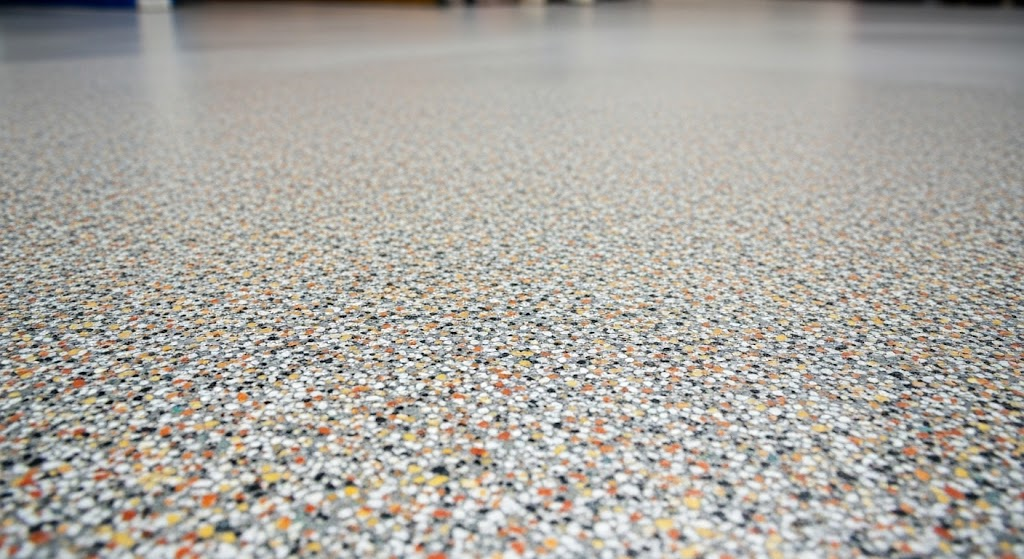
It involves broadcasting decorative color flakes onto the wet epoxy coating, creating a speckled finish that not only looks attractive but also improves traction.
This epoxy is commonly used in high-traffic areas or places where safety is important. It’s durable, easy to clean, and provides an anti-slip surface for improved grip.
Cost of Different Epoxy Flooring Types
The cost of epoxy flooring varies depending on the type, with each option providing different levels of durability, appearance, and performance to meet various garage requirements.
| Epoxy Type | Cost Range (per sq. ft.) | Description |
|---|---|---|
| Water-Based Epoxy | $2 to $6 | Budget-friendly, but less durable. Ideal for light-traffic areas. |
| Solvent-Based Epoxy | $4 to $10 | More durable and resistant than water-based, suitable for moderate traffic. |
| 100% Solids Epoxy | $8 to $15 | Most durable; ideal for high-traffic or commercial spaces. |
| Metallic Epoxy | $10 to $15 | Provides a unique, high-gloss, reflective finish, typically used for decorative purposes. |
| Flake Epoxy | $4 to $8 | Improves texture and slip resistance with decorative color flakes, making it ideal for both safety and visual appeal. |
Benefits of Epoxy Garage Floors
Epoxy garage floors offer numerous advantages, including durability, easy maintenance, and increased home value, making them a smart investment for any garage.
- Durability: Resistant to stains, cracks, and abrasions.
- Visual Appeal: Enhances the look of your garage with a sleek, modern finish.
- Easy Maintenance: Simplifies cleaning and upkeep, making it easier to maintain a clean garage.
- Increased Home Value: Potentially adds value to your property by improving the garage’s appearance and functionality.
- Slip Resistance: Provides added traction, making it safer to walk on, even when wet.
- Chemical Resistance: Resists damage from oils, grease, and other chemicals commonly found in a garage.
- Cost-Effective: Compared to other flooring options, epoxy is a relatively affordable way to improve your garage.
- Long-Lasting: Epoxy floors can last for many years with proper care and maintenance, reducing the need for frequent replacements.
- Customization: Offers a wide range of colors, textures, and finishes to match your style preferences.
- Environmental Benefits: Some epoxy options are eco-friendly and low in volatile organic compounds (VOCs).
Drawbacks to Consider
Despite its many benefits, epoxy flooring has some drawbacks, including potential slipperiness when wet, strong odors during application, and a long curing time, which may require careful planning.
- Slippery When Wet: Can be hazardous if not properly maintained or if there is excess water on the surface.
- Strong Odor During Application: Requires proper ventilation as the chemicals in the epoxy can emit strong fumes during application.
- Long Curing Time: May take several days to fully cure, which can limit the use of the garage for a period of time.
- Surface Preparation Required: Concrete must be cleaned and prepared properly, which can add time and cost to the installation process.
- May Yellow Over Time: Some epoxy coatings can yellow or discolor with exposure to UV light, especially in areas with lots of natural sunlight.
- Not Ideal for All Surfaces: Epoxy may not adhere properly to some types of concrete or surfaces that are already damaged.
- Initial Cost: Although durable, the upfront cost of professional installation and materials can be higher compared to other flooring options.
DIY vs. Professional Installation
When deciding between DIY and professional installation for your epoxy garage floor, several factors should be considered.
DIY installation is more cost-effective, as you’ll save on labor costs, but it requires time, effort, and skill.
If you have experience with similar home improvement projects and are comfortable handling the preparation and application process, DIY can be a great option.
However, it can be tricky to achieve the same smooth, durable finish that professionals can provide.
Professional installation, while more expensive, guarantees high-quality results and ensures that the epoxy is applied correctly.
Experts have the tools and experience to handle the surface preparation, mixing, and application, which can result in a longer-lasting, more durable floor.
If you want flawless results with minimal hassle, professional installation may be the best choice.
Tips for Saving on Epoxy Garage Floor Costs
By making strategic choices like opting for standard epoxy, handling DIY preparation, and comparing contractor quotes, you can reduce your epoxy garage floor costs without sacrificing quality.
- Opt for Standard Epoxy: Choose water-based or solvent-based options, which are more affordable than 100% solids or metallic epoxies.
- DIY Preparation: Handle surface cleaning, patching, and minor repairs yourself to cut down on labor costs.
- Compare Quotes: Obtain estimates from multiple contractors to ensure you’re getting the best price for professional installation.
- Choose a Simpler Finish: Skip the custom designs or metallic finishes and opt for a simpler, solid-colored epoxy for a more budget-friendly option.
- Buy Materials in Bulk: Purchase epoxy and supplies in bulk to take advantage of discounts, especially if you’re doing a larger space.
- Avoid Additional Add-Ons: Skip the extra features like decorative flakes or specialty coatings to keep costs low.
- Install During Off-Peak Seasons: Schedule the installation during off-peak times (like winter) to potentially get lower labor rates.
Conclusion
Epoxy garage floors offer a durable, attractive, and low-maintenance solution for upgrading your garage.
By understanding the various factors that influence cost, such as garage size, epoxy type, and installation methods, you can make an informed decision that fits your budget and needs.
While DIY options can save money, professional installation ensures long-lasting results with expert quality.
I recommend weighing the pros and cons of each approach and considering factors like durability, maintenance, and visual preferences when making your choice.
If you’re ready to change your garage with an epoxy floor, feel free to reach out for personalized advice and recommendations tailored to your space.

